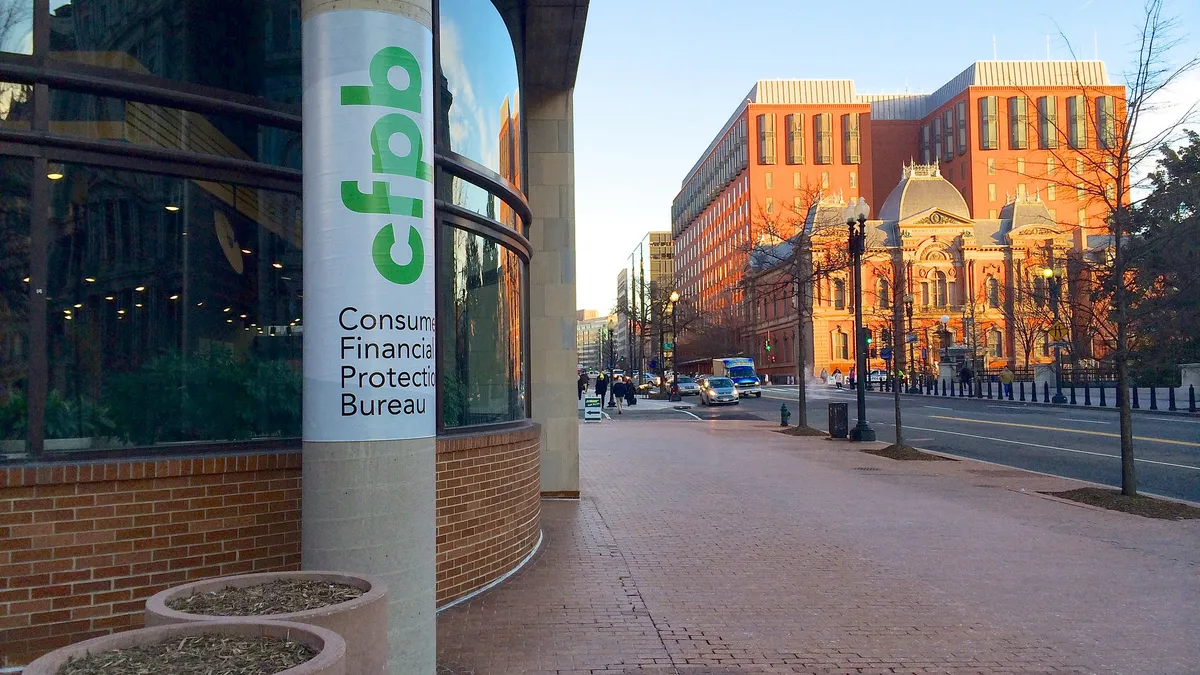Dive Brief:
- The Consumer Financial Protection Bureau (CFPB) on Tuesday removed the "ability-to-repay" provisions from a 2017 payday lending rule that never took effect, but has been the source of a drawn-out court battle.
- The provisions would have limited the number of consecutive, short-term loans a borrower could take out, and would have required lenders to verify borrowers' income. The restrictions were projected to save consumers — and cost lenders — $7 billion a year, the CFPB estimated.
- The CFPB will, however, let stand a provision in the 2017 rule to keep lenders from trying to withdraw funds from a borrower's bank account after two consecutive failed attempts. The provision also requires lenders to give consumers written notice before their first withdrawal attempt.
Dive Insight:
Payday lenders argued the 2017 rule would have slashed revenue by 55% for lenders that offer loans of 45 days or less, adding that depriving consumers of access to emergency credit would cause harm.
Payday lending opponents assert the greater harm is in the loans' often-high interest rates. Eighteen states and the District of Columbia have restrictions on payday loans, the Consumer Federation of America said. And some House Democrats want a 36% interest rate cap.
CFPB Director Kathy Kraninger, in a Tuesday press release, called the bureau's decision to scrap much of the 2017 rule a win for consumer choice.
"Our actions today ensure that consumers have access to credit from a competitive marketplace, have the best information to make informed financial decisions, and retain key protections without hindering that access," she said.
The Trump administration's opposition to the rule is well-documented. A former CFPB employee claimed last year, in a memo seen by The New York Times, that Trump appointees manipulated the agency's research process to justify changing the 2017 rule, which was completed shortly before Obama-era CFPB Director Richard Cordray resigned.
Two trade groups — the Community Financial Services Association of America and Consumer Service Alliance of Texas — sued the CFPB to invalidate the rule, and President Donald Trump's then-acting CFPB chief, Mick Mulvaney, sided with the plaintiffs. A district court judge in 2018 ordered a stay on the rule's compliance deadline to give the bureau time to rewrite it.
More than 100 House Democrats urged the CFPB last year to reconsider its effort to remove ability-to-repay requirements and push the judge to lift the stay.
Congress can try to overturn the CFPB's rule under the Congressional Review Act with a simple majority vote within 60 legislative days of the rule's publication in the Federal Register. Lawmakers tried that tactic with the Office of the Comptroller of the Currency's recent rewrite of the Community Reinvestment Act.
Consumer advocacy groups such as Public Citizen or the National Consumer Law Center may challenge the CFPB in court, arguing the bureau violated the Administrative Procedure Act that requires rigorous research and analysis, not just a policy disagreement, to change existing rules, American Banker reported.
"In the middle of an economic and public health crisis, the C.F.P.B.'s director chose to put a bunch of time and energy into undoing a protection that would have saved borrowers billions in fees," Linda Jun, senior policy counsel for another consumer advocacy group, Americans for Financial Reform, said Tuesday, according to The New York Times.
Sen. Sherrod Brown, D-OH, in a statement Tuesday, said the CFPB "gave payday lenders exactly what they paid for by gutting a rule that would have protected American families from predatory loans."
Payday lenders have given $16 million to primarily GOP congressional candidates since 2010, the Center for Responsive Politics said.
The CFPB has encouraged banks to offer installment loans or lines of credit for amounts of up to $2,500. The bureau issued a no-action letter template in May that aims to let companies develop such credit products without action from regulators.














